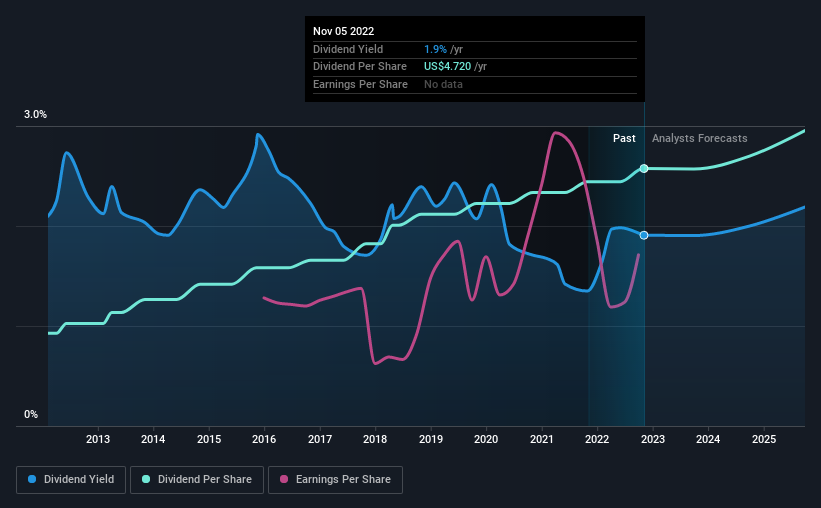Income Investors Should Know That Rockwell Automation, Inc. (NYSE:ROK) Goes Ex-Dividend Soon
Rockwell Automation, Inc. (NYSE:ROK) stock is about to trade ex-dividend in three days. Typically, the ex-dividend date is one business day before the record date which is the date on which a company determines the shareholders eligible to receive a dividend. It is important to be aware of the ex-dividend date because any trade on the stock needs to have been settled on or before the record date. Meaning, you will need to purchase Rockwell Automation's shares before the 10th of November to receive the dividend, which will be paid on the 12th of December.
The company's next dividend payment will be US$1.18 per share, and in the last 12 months, the company paid a total of US$4.72 per share. Looking at the last 12 months of distributions, Rockwell Automation has a trailing yield of approximately 1.9% on its current stock price of $247.43. Dividends are an important source of income to many shareholders, but the health of the business is crucial to maintaining those dividends. We need to see whether the dividend is covered by earnings and if it's growing.
See our latest analysis for Rockwell Automation
Dividends are typically paid from company earnings. If a company pays more in dividends than it earned in profit, then the dividend could be unsustainable. Rockwell Automation paid out 56% of its earnings to investors last year, a normal payout level for most businesses. That said, even highly profitable companies sometimes might not generate enough cash to pay the dividend, which is why we should always check if the dividend is covered by cash flow. It paid out 76% of its free cash flow as dividends, which is within usual limits but will limit the company's ability to lift the dividend if there's no growth.
It's encouraging to see that the dividend is covered by both profit and cash flow. This generally suggests the dividend is sustainable, as long as earnings don't drop precipitously.
Click here to see the company's payout ratio, plus analyst estimates of its future dividends.
Have Earnings And Dividends Been Growing?
Businesses with strong growth prospects usually make the best dividend payers, because it's easier to grow dividends when earnings per share are improving. If earnings fall far enough, the company could be forced to cut its dividend. This is why it's a relief to see Rockwell Automation earnings per share are up 4.7% per annum over the last five years. A payout ratio of 56% looks like a tacit signal from management that reinvestment opportunities in the business are low. In line with limited earnings growth in recent years, this is not the most appealing combination.
The main way most investors will assess a company's dividend prospects is by checking the historical rate of dividend growth. Since the start of our data, 10 years ago, Rockwell Automation has lifted its dividend by approximately 11% a year on average. We're glad to see dividends rising alongside earnings over a number of years, which may be a sign the company intends to share the growth with shareholders.
Final Takeaway
Is Rockwell Automation worth buying for its dividend? Earnings per share have been growing modestly and Rockwell Automation paid out a bit over half of its earnings and free cash flow last year. Overall, it's hard to get excited about Rockwell Automation from a dividend perspective.
So if you want to do more digging on Rockwell Automation, you'll find it worthwhile knowing the risks that this stock faces. In terms of investment risks, we've identified 2 warning signs with Rockwell Automation and understanding them should be part of your investment process.
If you're in the market for strong dividend payers, we recommend checking our selection of top dividend stocks.
Have feedback on this article? Concerned about the content? Get in touch with us directly. Alternatively, email editorial-team (at) simplywallst.com.
This article by Simply Wall St is general in nature. We provide commentary based on historical data and analyst forecasts only using an unbiased methodology and our articles are not intended to be financial advice. It does not constitute a recommendation to buy or sell any stock, and does not take account of your objectives, or your financial situation. We aim to bring you long-term focused analysis driven by fundamental data. Note that our analysis may not factor in the latest price-sensitive company announcements or qualitative material. Simply Wall St has no position in any stocks mentioned.
Join A Paid User Research Session
You’ll receive a US$30 Amazon Gift card for 1 hour of your time while helping us build better investing tools for the individual investors like yourself. Sign up here

 generic
generic 
